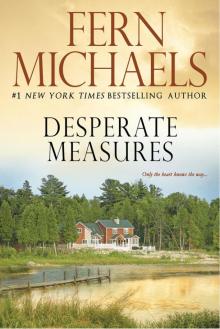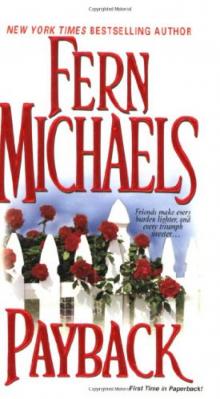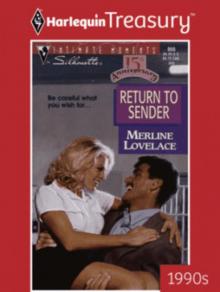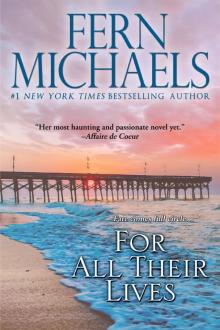- Home
- Fern Michaels
Deep Harbor Page 2
Deep Harbor Read online
Page 2
This particular house was one of the biggest, most prestigious custom-built houses in all of Kalorama, matching the elegance and historic themes of the neighborhood. She had interesting neighbors, including some of the country’s highest-profile politicians and their offspring. But that merely made her feel more isolated. Not that she cared a twit about her neighbors, the house’s architecture, or its furnishings, as opulent as they were. She’d give it all up in a heartbeat to have her brother Kick back in her life, so she wouldn’t feel like an orphan.
When CJ was ten years old, she had been on an overnight Girl Scout camping trip when their parents died in a fiery car wreck on the way home from a yachting regatta. Kick had blamed himself because he had been racing that day. Why had he insisted that they come for the festivities? He had been racing for several years and was finally confident enough in his skills to have his family on hand. After the accident, he was guilt-ridden and took over parenting his sister. Kick had raised her, and she, in turn, had loved and adored him.
Kick was whip-smart, and by the time he, too, had been taken from her in a boat-related accident, he and Colin Kelly owned a string of sixty-four restaurants. The chain was called KC’s Hatchery.
“How bizarre,” she would often think. Her parents were killed coming home from a boating party and her brother was killed in a boating accident almost twenty years to the day later. She wasn’t sure if she could go near the water ever again. Even jogging along the Tidal Basin gave her the willies at times.
When their parents died, it had become local gossip that the Jansens had no money. The high life of social galas, together with conspicuous overspending, had taken its toll on the family finances. The Jansens should have downsized years before they died, but CJ’s mother was all about “what people thought,” and the embarrassment would have killed her.
At the time of their parents’ death, Kick had already graduated from the Culinary Institute of America in Hyde Park, New York, and had just gotten his MBA from Wharton. He was the “it” boy of up-and-coming restaurateurs in the DC area when his parents were killed. A life insurance policy was all that remained of their estate; their impersonation of the upper-middle-class wealthy had left them with virtually nothing else. Even their house was mortgaged to the hilt. Kick was able to use the insurance money to support CJ—at least until he could get more backing for his restaurant enterprise. One of the first people to pony up investment money was Colin Kelly, who became Kick’s partner in KC’s Hatchery and, eventually, his life partner.
CJ had inherited everything except for one piece of property that Colin kept—a cabin near Salisbury on the eastern shore of Maryland. Colin and Kick would spend weekends there when they wanted to get away from all the glitz and social climbers. The Wallet Sniffers. People who always had their hand out, looking for a loan or presenting a new business proposition that needed financing. Colin and Kick were great partners, in life and business. Kick knew how to run a restaurant, and Colin knew the business side. Investing was second nature to Colin, and his skill at dealing with people was equally impressive.
After Kick’s death, when the property had been settled and the will read, CJ saw—for the first time—the brokerage accounts that were now hers. They were so robust that she almost got dizzy just looking at the bottom line. She had wanted Colin to take all of Kick’s estate, but he absolutely refused. He didn’t want the house or Kick’s half of KC’s Hatchery; he didn’t want the Italian sports cars in the garage. He didn’t want the Aspen ski chalet or the estate in Hawaii that Kick had purchased from his share of the profits. The cabin was the only thing that gave Colin the very personal and intimate connection with Kick that he wished to maintain even after Kick’s death.
In spite of all the restaurants, it was the cabin that Colin and Kick had been the most proud of, a place to which they could retreat away from the prying eyes of the public. It was something they had literally built—together. Each weekend for years, they would go to Home Depot and load up their supersized pickup truck and head out.
With Kick’s death, other than the cabin, CJ owned all the property, including half of KC’s Hatchery, which made her a very rich woman indeed. She could have retired at age thirty and lived a life of leisure. But she wasn’t comfortable with any of it and had never given a moment’s thought to retiring. She remembered hearing her parents arguing in the dark of night about money, and how much self-control it took for her father not to lose his temper over her mother’s self-indulgence.
CJ sighed. Someday, she was going to figure out why she tortured herself like this every day. She didn’t have to live here. She could live anywhere she wanted in Washington or the suburbs of Maryland or Virginia. After Kick had died, she somehow convinced herself that he wanted her here. Otherwise, she concluded, he wouldn’t have left the ten-thousand-square-foot house to her, along with all the rest of his worldly possessions. He would have left them to Colin.
Colin had explained to her in great detail how he and Kick had made wills and how their property was to be distributed if either one of them died. Colin would get the cabin if Kick died, just as Kick would have gotten it if Colin had died. She couldn’t argue with him after that discussion. He was very clear. And totally sincere. So, she had no option other than to accept Kick’s wishes as expressed in his will. Nonetheless, she had never touched the money in the estate or the cars in the garage. She’d never visited the vacation spots, either. Yes, she did live in the house—that was her one concession. She used the large guest bedroom suite on the first floor. It had a luxurious adjoining bath, a small sitting room, and sliding doors that opened onto a patio surrounded by impeccable landscaping. Down the hall was the monster kitchen in which she cooked on rare occasion. Her “cooking” amounted to using a microwave to heat up a prepared dish, or perhaps leftover Chinese food she had brought home. More often than not, because of her late hours, she ate out, ordered in, or picked up something on the way home. Clearly, she was no chef like her brother.
Shaking her head over the memories of the past and the bizarre circumstance of the afternoon, she finally punched the code for the garage door, drove in, parked, and turned off the engine.
Except for her old junkmobile, the garage looked like a European sports car showroom with three Italian beauties in it: a red Maserati, an electric-blue Lamborghini, and a canary-yellow Alfa Romeo. They were all spectacular sports cars. In his leisure hours, if Kick wasn’t sailing, he’d be motoring on long journeys in one of his “babies.” It was his only real indulgence. The vacation homes were mostly used for cooking classes for teens who showed promise in the kitchen. There would be regional competitions, and Kick would select a handful of young adults, both men and women, who would spend several days under his tutelage. It was a superb opportunity for the young chefs.
Snapping out of her deep thoughts, CJ frowned and looked at the contrast between her heap and the shining exteriors of the Italian sports cars, exteriors whose gloss she maintained by having her local mechanic’s son come every other month to keep them in top-notch condition, wiping, polishing, and taking them for a spin in the neighborhood so that they remained in fine shape.
She did a quick jog to the door leading to the kitchen but first she had to wait for the retina scanner and thumbprint scanner to recognize her, after which she had to type in a code that changed every three days, a reminder of the new code kept in her cell phone.
In plain English, it was a pain in the ass, but she was safe here in Kick and Colin’s fortress. Today, she was thankful for the security. That encounter with Snapper and Mr. Crappy Cologne left her more than slightly at sea.
There was nothing particularly welcoming about the state-of-the-art kitchen because CJ had never taken the time to do anything with it. There were no green plants, no colorful place mats, no knickknacks, no magnets on the Sub-Zero refrigerator. Nothing was color coordinated. It was just a kitchen. Everything in it was high-tech, functional, and totally sterile.
CJ kicked
off her sneakers, marched barefoot to the wine cooler, and pulled out a bottle of Caymus Cabernet. This was going to be both her main course and her dessert. She needed to think. She absentmindedly opened the bottle with the wall-mounted BOJ corkscrew and poured the wine into a Baccarat goblet. She curled up on the window seat and gazed out at the backyard. It was still a little light out, so she could see the flowering shrubs along the borders and the Bloodgood Japanese maple in the center of the lawn. She downed the first glass in two gulps and poured another.
Snapper was in trouble, of that there was no doubt. Whether it was of his own making or not, she had no way of knowing. And it had something to do with Robotron, whatever that was. And the guy with the awful-smelling cologne that he apparently bathed in? She wondered how Snapper could know someone like that, someone who had kicked Snapper to the ground, then forced him to apologize, no less. It didn’t make any sense. Kick had always said that when something didn’t make sense, it was probably because someone was doing something that was just plain stupid.
CJ was about to pour her third glass of wine when she thought about her early appointment with her therapist. She quickly sent off a text to the shrink’s after-hours phone. No way was she going to keep that appointment tomorrow, not with what was going on at the office. She was going to go in early and see how Snapper had documented the phantom phone call that had probably never happened, and she would check the log book to see how he recorded Mr. Crappy Cologne’s visit. She was virtually certain that there would be no entry for a phone call or a visit. She could mention the phone call but not the visit. To do so would alert Snapper that she had been in the office after she had left for the day.
Maybe she needed to eat something. Crackers, maybe, but she didn’t have any. She looked in the Sub-Zero, but the only thing in there was a wedge of cheese and some leftover Chinese food, with hair growing on it. After she tossed the Chinese, she ripped the wrapper off the cheese and bit down. Extra sharp cheddar. With a real tang. It made her eyes water. She spit it out and went back to her goblet to rinse her mouth. “How about that for spending money wisely,” she quipped, “a sixty-five-dollar bottle of mouthwash!” Being wasteful wasn’t her style. But a good bottle of wine was about the only extravagance she allowed herself.
Chapter 2
Congressman Lewis fumbled with his key fob at the door of his Watergate condo. His hand was shaking so badly, it took three tries before he managed to get the door unlocked. He pushed the door open and galloped into the condo as though hounds were on his heels. He loved hearing the sound of the door closing, knowing it would lock automatically. He dropped his heavy briefcase in the middle of the foyer and made a beeline for the bar on the wall of the long, spacious living room. The room was his favorite place in the whole twenty-five-hundred-square-foot condominium. From that room, he had a spectacular view of the city. He thought about making his special martini—five ounces of gin, one-half ounce of vermouth, a twist of lemon, and some Angostura bitters—but decided he needed a pure hit of the twenty-five-year-old Glenlivet scotch he kept for special occasions. Not that this was the kind of occasion he had been thinking of. Hand shaking, he upended the bottle and guzzled until his eyes started to water. Then he poured two ounces into a squat tumbler and headed for the black leather sofa in the middle of the room.
“Son of a bitch!” he bellowed to the emptiness around him. “Son of a bitch!” he roared a second time. He gulped at the amber liquid in the tumbler, then set it down on the glass coffee table with a thump. Why was he so upset? He had known this day might come. Knew it in every pore of his body. He had lived in fear of it, and now that it was here, he wasn’t prepared.
How weird that he could handle world affairs, raise money out the wazoo, schmooze on both sides of the aisle, and yet he couldn’t take care of his own goddamn business.
Snapper leaned back into the soft, luxurious, leather sofa and closed his eyes. Life as he’d come to know it was never going to be the same. He mourned the loss as his mind raced. But did he deserve to go down in flames for trying to help a family member? Didn’t his thirty years in the House of Representatives count, the last six of which as the chairman of the Ways and Means committee after being the ranking member for two years before that? But he knew that he would be remembered—if he was remembered at all—for what was about to happen, and it made him feel sick to his stomach. Too much whiskey with no food. Not a good plan.
He struggled out of the depths of the sofa and shuffled into the kitchen, where he made a pot of coffee and headed to the master bedroom. He stripped down and pulled on a set of ancient sweats from his college years, which still fit his six-foot-two, two-hundred-twenty-pound frame. They were like old friends, and he would never give them up, not for anything. They defined him was how he thought of it. He was never an “out-with-the-old-and-in-with-the-new” kind of guy. He padded back to the kitchen to make himself a sandwich.
Snapper’s twice-a-week day-housekeeper always made sure the refrigerator was full. Snapper wondered who ate the food because he rarely ate at home even though he was an excellent cook. But cooking took time, one of the few things he did not have. He finally came to the conclusion the she ate the food herself or took it home to her family. And could he begrudge her that? Not at all. She was a woman of modest means, and since he hated to see anything go to waste, he never said a word, glad that he could help.
Snapper sliced thick pieces from an Applewood Farms ham. Adding lettuce, tomatoes, and Duke’s Mayonnaise, he had it all. The sandwich was so thick, he had to press down with the palms of his hands or he wouldn’t be able to bite into it. He forced himself to eat and drank two cups of black coffee. Eyeing the Glenlivet bottle he’d carried into the kitchen, he shook his head. He had had enough for one day. He needed his wits about him from here on in.
Jesus, Mary, and Joseph! He’d forgotten all about the black-tie dinner at the Armory. Damn it to . . . He looked at the clock. By now, the waitstaff would be serving dessert and coffee. There was no way he could make it at this point. He consoled himself with the fact that Dick Franz, the congressman from Delaware, had told him in the middle of the afternoon that he was going home because of a stomach bug that had hit the House Office Building. As far as excuses went, it would have to do. Not that he usually cared one way or another about missing a dinner. And right now, he certainly didn’t care. Tomorrow, when he had to explain to CJ why he didn’t attend, would be a different story. But the stomach excuse would suffice.
Carol Anne Jansen, with the winsome smile, shoulder-length light brown hair, and sparkling blue eyes. If he had a daughter, he would want her to be just like CJ. He was so fond of her that he had put her in his will. Although, her being much wealthier than he could hope to be, she would never need anything from him, but it was a gesture on his part to sho"w how much he valued her as a person. He appreciated and loved her loyalty to him and her job. Little did she know he had a complete dossier on her filed away in the condo directly underneath where he was standing. He’d taken a page out of J. Edgar Hoover’s playbook and kept dossiers on every single member of the House of Representatives and the Senate. He had years’ and years’ worth of files. One just never knew what to expect in Washington, so it was “cover your ass” no matter how low you were or how high you rose. And he had done just that.
Only on a very rare occasion was he required to use any of the information he’d compiled to get a bill passed. But now it looked like he was going to have to use some of it when the Medical Advancement financing bill came up for a vote in three days. What mattered was Robotron, not necessarily the good of the people. But then again, rarely was legislation altruistic, more often being a matter of which special interests stood to gain from any piece of legislation and how that would affect one’s chances of reelection.
Snapper tidied up the kitchen and cleaned the coffeepot before he headed to the stairway that would take him down to the condo he’d bought directly underneath this one. He owned the lower condo
but didn’t live in it. It was basically a “safe house,” except that rather than a place of safety for people, it was a repository of information. The condo had only the bare essentials in the way of furnishings, which kept the maintenance down to a minimum. Still, the dusty remnants of his best friend Billy Sykes remained.
Billy and Snapper had been friends for years, from even before Snapper had first been elected to the House. Billy was also his accountant and financial advisor. Billy, in fact, was someone he trusted with his life. The trust from which the bills for Snapper’s brother’s care were paid was in a fictitious name that Billy had arranged. It had taken a lot of maneuvering, but Billy was magician-like when it came to moving money. He had even managed to transfer the proceeds from the sale of the Lewis family horse farm in Colts Neck into that special account. A little less than one and a half million dollars. Seemed like a lot of money at the time, but with the facility charging twenty-five thousand a month for George’s care, he had known that even with a 5 percent return on the principal and the one million from the insurance company it would barely last ten years, and they were now going into year thirteen at Sun Valley Institute. . . long past George’s life expectancy.
When George was thirty-five, he had suffered a brain aneurism. The medical term was subarachnoid hemorrhage. Similar to a stroke. It had left George debilitated to the extent he could not speak and lost all movement on the entire left side of his body. He needed round-the-clock care. He was given a very grave prognosis. Maybe two, three years to live. By that time, Snapper, at age forty-seven, was beginning his ninth term in Congress. But as the years passed, George remained in a comatose state. The EEG showed some brain activity, but there was no physical movement of any kind. He was not technically brain-dead, so the artificial care continued. Snapper recalled the Karen Ann Quinlan case, in which she did not die until nine years after her family obtained a court order to remove her from the “extraordinary means” of a ventilator, but Snapper was not about to unplug his brother.

 Safe and Sound
Safe and Sound Santa Cruise
Santa Cruise Deep Harbor
Deep Harbor Truth and Justice
Truth and Justice Far and Away
Far and Away The Christmas Stocking
The Christmas Stocking 18. Cross Roads
18. Cross Roads Texas Sunrise
Texas Sunrise Take Down (The Men of the Sisterhood)
Take Down (The Men of the Sisterhood) Sleigh Bells
Sleigh Bells A Golden Tree
A Golden Tree About Face
About Face To Taste The Wine
To Taste The Wine Texas Rich
Texas Rich 15. Vanishing Act
15. Vanishing Act To Have and to Hold
To Have and to Hold Eyes Only
Eyes Only Fearless
Fearless 5. Sweet Revenge
5. Sweet Revenge A Season to Celebrate
A Season to Celebrate Cut and Run
Cut and Run 8. Hide and Seek
8. Hide and Seek A Snowy Little Christmas
A Snowy Little Christmas Hidden
Hidden Sins of the Flesh
Sins of the Flesh 3. Vendetta
3. Vendetta Desperate Measures
Desperate Measures No Way Out
No Way Out Late Edition
Late Edition 11. Collateral Damage
11. Collateral Damage Texas Heat
Texas Heat Forget Me Not
Forget Me Not 4. The Jury
4. The Jury 16. Deadly Deals
16. Deadly Deals Plain Jane
Plain Jane Crown Jewel
Crown Jewel Sweet Vengeance
Sweet Vengeance 19. Deja Vu
19. Deja Vu Point Blank
Point Blank Truth or Dare
Truth or Dare Family Blessings (Cisco Family)
Family Blessings (Cisco Family) Classified
Classified The Blossom Sisters
The Blossom Sisters Spirited Away
Spirited Away Wishes for Christmas
Wishes for Christmas What You Wish For
What You Wish For Fancy Dancer
Fancy Dancer 14. Razor Sharp
14. Razor Sharp I'll Be Home for Christmas
I'll Be Home for Christmas Vegas Sunrise
Vegas Sunrise Trading Places
Trading Places Charming Lily
Charming Lily Cross Roads
Cross Roads Balancing Act
Balancing Act Cinders to Satin
Cinders to Satin A Family Affair
A Family Affair A Winter Wonderland
A Winter Wonderland 17. Game Over
17. Game Over Hokus Pokus (The Sisterhood: Rules of the Game, Book 2)
Hokus Pokus (The Sisterhood: Rules of the Game, Book 2) Picture Perfect
Picture Perfect Dear Emily
Dear Emily 9. Hokus Pokus
9. Hokus Pokus Cross Roads - Sisterhood book 18
Cross Roads - Sisterhood book 18 Blindsided
Blindsided Fast Track
Fast Track Hey, Good Looking
Hey, Good Looking Kentucky Heat
Kentucky Heat Yesterday
Yesterday Weekend Warriors
Weekend Warriors Coming Home for Christmas
Coming Home for Christmas Vanishing Act
Vanishing Act Gotcha!
Gotcha! Home Free
Home Free Fast Track (The Sisterhood: Rules of the Game, Book 3)
Fast Track (The Sisterhood: Rules of the Game, Book 3) Holly and Ivy
Holly and Ivy Fool Me Once
Fool Me Once The Most Wonderful Time
The Most Wonderful Time Exclusive
Exclusive Jingle All the Way
Jingle All the Way Vendetta
Vendetta Kentucky Rich
Kentucky Rich Lethal Justice
Lethal Justice The Future Scrolls
The Future Scrolls Deja Vu
Deja Vu Getaway
Getaway Mistletoe Magic
Mistletoe Magic Seasons of Her Life
Seasons of Her Life When the Snow Falls
When the Snow Falls Breaking News
Breaking News 2. Payback
2. Payback Under the Radar
Under the Radar Serendipity
Serendipity High Stakes
High Stakes Need to Know
Need to Know Captive Innocence
Captive Innocence Countdown
Countdown Return to Sender
Return to Sender Fast and Loose
Fast and Loose Sara's Song
Sara's Song Razor Sharp
Razor Sharp 6. Lethal Justice
6. Lethal Justice Hokus Pokus
Hokus Pokus 13. Under the Radar
13. Under the Radar 7. Free Fall
7. Free Fall Collateral Damage
Collateral Damage Whitefire
Whitefire Upside Down
Upside Down Southern Comfort
Southern Comfort Celebration
Celebration 1. Weekend Warriors
1. Weekend Warriors 10. Fast Track
10. Fast Track Making Spirits Bright
Making Spirits Bright Silver Bells
Silver Bells Holiday Magic
Holiday Magic Christmas At Timberwoods
Christmas At Timberwoods Captive Embraces
Captive Embraces Winter Wishes
Winter Wishes Listen To Your Heart
Listen To Your Heart Kentucky Sunrise
Kentucky Sunrise Tuesday's Child
Tuesday's Child Final Justice
Final Justice Free Fall
Free Fall No Safe Secret
No Safe Secret Deadly Deals
Deadly Deals Wish List
Wish List Pretty Woman
Pretty Woman Payback
Payback Mr. And Miss Anonymous
Mr. And Miss Anonymous The Scoop
The Scoop In Plain Sight
In Plain Sight The Nosy Neighbor
The Nosy Neighbor Final Justice: Sisterhood Series #5
Final Justice: Sisterhood Series #5 Sins of Omission
Sins of Omission The Jury
The Jury Captive Secrets
Captive Secrets Hide and Seek (The Sisterhood: Rules of the Game, Book 1)
Hide and Seek (The Sisterhood: Rules of the Game, Book 1) Crash And Burn
Crash And Burn Sweet Revenge
Sweet Revenge Secret Santa
Secret Santa 20. Home Free
20. Home Free Game Over
Game Over For All Their Lives
For All Their Lives 12. Final Justice
12. Final Justice Hideaway
Hideaway Perfect Match
Perfect Match